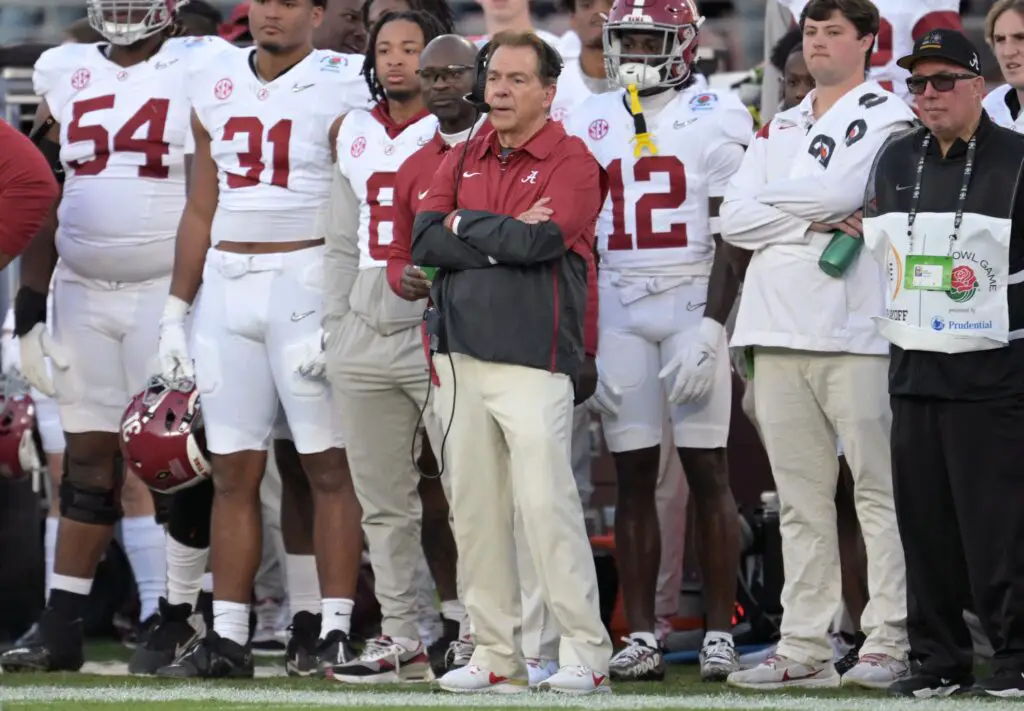Iconic college football coaches have left an indelible mark on the sport, in some cases transcending the game. These legendary figures have not only won championships but have also shaped the lives of countless young athletes and influenced the game in profound ways. Let’s explore 10 college football coaches who have achieved legendary status through their accomplishments, leadership, and lasting impact on the sport.
Legendary College Football Coaches
1. Bear Bryant (Alabama)
Paul “Bear” Bryant is arguably the most iconic figure in college football history. During his 25-year tenure at Alabama (1958-1982), Bryant led the Crimson Tide to six national championships and 13 conference titles. His career record of 323-85-17 stood as the all-time wins record for many years.
Bryant’s influence extended far beyond his win-loss record. He was known for his tough, disciplined coaching style and his ability to mold young men into not just great football players, but also responsible adults. His trademark houndstooth hat became a symbol of Alabama football and his legacy continues to loom large over the program and college football as a whole.
2. Knute Rockne (Notre Dame)
Knute Rockne is considered the father of modern football coaching. During his 13 years at Notre Dame (1918-1930), Rockne revolutionized the game with his innovative strategies, including the forward pass and the shift. His career record of 105-12-5 and .881 winning percentage remain among the best in college football history.
Rockne’s charismatic personality and motivational skills made him a national figure. His “Win one for the Gipper” speech is one of the most famous in sports history. Despite his tragically short life (he died in a plane crash at 43), Rockne’s impact on college football is immeasurable.
3. Woody Hayes (Ohio State)
Woody Hayes led Ohio State for 28 years (1951-1978), winning five national championships and 13 Big Ten titles. Known for his “three yards and a cloud of dust” offensive philosophy, Hayes was a proponent of smash-mouth, run-first football.
Hayes was known for his fiery temperament and intense competitiveness, which sometimes led to controversy and heated arguments with other college football coaches. Despite this, his dedication to his players’ academic success and personal development was well-known. Many of his former players went on to successful coaching careers, extending his influence on the game.
4. Tom Osborne (Nebraska)
Tom Osborne’s 25-year tenure at Nebraska (1973-1997) was marked by incredible consistency and success. He never won fewer than 9 games in a season and captured three national championships in his final four years.
Osborne was known for his calm demeanor and innovative offensive schemes. His teams were known for their powerful rushing attacks and disciplined play. After retiring from coaching, Osborne served in Congress and later returned to Nebraska as athletic director, further cementing his legendary status in the state.
5. Joe Paterno (Penn State)
Joe Paterno’s 46-year tenure at Penn State (1966-2011) made him the face of the program for generations, and easily one of the most iconic college football coaches ever. With 409 career wins, Paterno holds the record for most victories by an FBS coach. He led Penn State to two national championships and five undefeated seasons.
Paterno was known for his emphasis on academics and character development, coining the term “Grand Experiment” to describe his philosophy of blending athletic and academic excellence. His career ended in controversy, but his impact on Penn State and college football remains significant.
6. Bobby Bowden (Florida State)
Bobby Bowden transformed Florida State from a struggling program into a national powerhouse during his 34-year tenure (1976-2009). He led the Seminoles to two national championships and an unprecedented 14 consecutive top-5 finishes from 1987 to 2000.
Known for his folksy charm and offensive innovation, Bowden was one of the most beloved figures in college football. His “dadgum” catchphrase and trick plays became as much a part of his legend as his 377 career wins.
7. Eddie Robinson (Grambling State)
Eddie Robinson’s 57-year career at Grambling State (1941-1997) is one of the most remarkable in sports history. He amassed 408 wins, sent over 200 players to the NFL, and was a pioneer for African American coaches.
Robinson’s impact extended far beyond football. He was a father figure to his players and a leader in the civil rights movement. His success at a historically black college brought national attention to HBCU football and opened doors for many African American players and coaches.
8. Amos Alonzo Stagg (Chicago)
Amos Alonzo Stagg’s coaching career spanned an incredible 71 years, most notably at the University of Chicago (1892-1932). He is credited with numerous innovations in football, including the huddle, the reverse play, and the tackling dummy.
Stagg’s influence on the game is hard to overstate. He was one of the founding fathers of the Big Ten Conference and played a crucial role in popularizing football in the Midwest. His legacy is honored through the Amos Alonzo Stagg Award, given annually by the American Football Coaches Association.
9. Bud Wilkinson (Oklahoma)
Bud Wilkinson led Oklahoma to unprecedented success during his 17-year tenure (1947-1963). His teams won three national championships and an incredible 47 consecutive games from 1953 to 1957, a record that still stands.
Wilkinson was known for his innovative Split-T formation and his emphasis on conditioning. He also had a significant impact off the field, serving on President Kennedy’s Council on Physical Fitness and later running for the U.S. Senate.
10. Nick Saban (Alabama)
The only very recently active coach on this list, Nick Saban has already secured his place among the all-time greats. Since taking over at Alabama in 2007, Saban led the Crimson Tide to six national championships, cementing the program’s status as the dominant force in modern college football. At the center of heated SEC rivalries with LSU, where he won a national title, Florida, Georgia, and of course Auburn, had Saban front and center.
Saban’s “Process” philosophy, emphasizing focus on execution rather than results, has become a model for programs across the country. His ability to consistently recruit and develop top talent set a new standard in college football.
Conclusion
These 10 college football coaches represent the pinnacle of achievement in the game. Their success on the field is matched by their influence off it, shaping not just the sport but the lives of countless young athletes. From Bear Bryant’s disciplined approach to Nick Saban’s “Process,” from Knute Rockne’s innovations to Eddie Robinson’s trailblazing career, each of these coaches has left an indelible mark on college football.
Their legacies extend far beyond their win-loss records. They’ve shaped conference alignments, revolutionized offensive and defensive strategies, and in many cases, become cultural icons. The impact of these legendary coaches continues to be felt in college football today, influencing current coaches, players, and programs.
As college football continues to evolve, with changes in rules, player compensation, and conference structures, the accomplishments of these legendary coaches serve as a benchmark for excellence. Their stories inspire new generations of coaches and players, ensuring that their influence on the sport will continue for years to come.

